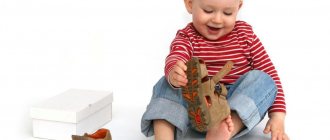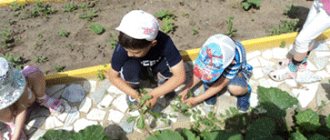What are self-care skills?
First, let's understand what is included in the concept of self-care skills. In general, this is the child’s ability to independently maintain hygiene and perform necessary self-care procedures. Self-care skills include the habit of regularly brushing your teeth and combing your hair, going to the toilet on your own, dressing and undressing, using cutlery accepted in society, and so on. Sometimes self-care skills also include basic communication skills with others.
Are there special exercises for developing self-care skills?
Of course, experienced parents have tried many ways to teach their child to dress and take care of himself. We offer five educational exercises for children that will help develop self-care skills:
- Exercises to practice individual operations. Let's assume that the baby has difficulty putting on shoes. What does the process consist of? Putting your foot into a shoe, mastering various fasteners. Each of these operations can become part of a separate game: inserting and removing your feet into different shoes at speed or in accordance with the named color, fastening fasteners on clothes and holding the shoe in your hands. Any idea for a game that you and your baby like will be beneficial.
- Observation of household members. Children learn a huge part of their skills by repeating the actions of adults; they literally copy our behavior on an instinctive level, so the tradition of brushing teeth with the whole family or getting together for dinner not only contributes to family cohesion, but also allows the child to observe how adults cope with a variety of tasks.
- Role-playing games. Role-playing games for preschoolers are a real lifesaver for parents. A teddy bear or favorite doll can greatly speed up the process of mastering the skills of dressing or brushing your teeth.
- Let your child help you. Some skills (for example, combing hair) are quite difficult to practice on yourself right away. Give your baby the opportunity to help you with your hair.
- Play against the clock and set timers. Clear time frames are another incredibly effective tool in parenting. A visual display of time (such as an hourglass) helps a child focus on a task and also develops a general sense of time.
Children learn self-care skills through observation and repetition, as well as through play. In order to choose a suitable activity, analyze what your baby does better and what worse. Break down the missing skills into operations and select activities that are related to the development of these operations. You can always look for ideas in parent communities or ask for advice from teachers and child psychologists.
How to help your child develop his skills?
Of course, the question arises, how to help a child master all these numerous and sometimes complex skills? Having collected the experience of other parents and recommendations from teachers, we have identified five tips for instilling independence in children in everyday matters:
- Create colorful step-by-step instructions or checklists and hang them on the wall. Such cards will help kids remember the order of actions, which is especially important when getting dressed, when the child has to keep a long chain of operations in his head.
- Divide complex actions into small steps. Don’t try to teach your child everything at once; break down entire tasks into a sequence of individual operations. Today we learn to pull on socks, tomorrow we learn to put our foot into a shoe, and the day after tomorrow we focus on Velcro.
- Be consistent. Make it a rule that while the child is small, he solves one everyday problem in one way, this will allow him to quickly learn the necessary actions. You will expand your repertoire and work on creativity after mastering the basic skill, but for now try to keep things in their place, personal care procedures have their own routine, and a new hygiene item or item of clothing is not too different from its predecessor.
- Use short and clear instructions. What to take, what actions to take. Repeat instructions without changing the sequence of actions and use the same words and wording, this promotes memorization.
- Allow enough time. “We don’t have time to wait while he digs around!” — parents are indignant when we begin to understand the reasons for the child’s lack of independence. This approach not only does not allow the child to develop, but also exposes him to constant stress. Imagine if, after a couple of demonstrations, you were forced to quickly tie special sea knots or play some melody without mistakes. This is exactly how the child sees the situation. There are two options: initially allocate twice as much time for the necessary procedures or, as a last resort, help him complete the task.
The Unobvious Benefits of Self-Care Skills
The obvious bonuses of mastering self-care skills are clear: the baby becomes more independent, and you no longer need to monitor his every step. However, many parents neglect self-care skills, focusing more on developing the child's thinking and creativity. However, teachers and psychologists unanimously argue that self-care makes an unobvious but tangible contribution to literally all areas of a child’s life.
Child cognitive development
Learning a sequence of actions has a beneficial effect on the development of memory and thinking, and is involved in improving the child’s attention. It should also be remembered that the more skills a child has already mastered, the better he will be able to navigate a new situation for him, so self-service skills also contribute to the child’s overall intelligence.
Development of coordination and fine motor skills
Have you ever wondered how well you need to control your body in order to put on a T-shirt, handle a button, or tie your shoelaces? Numerous small actions that the baby has to perform when dressing and other procedures become real exercises for the development of fine and gross motor skills.
Impact on communication with other people
In our society, self-care skills are understood as an indicator of a person’s adequacy; we even unconsciously evaluate people by their appearance and neatness. A child who, by the age of 6-7 years, has problems getting dressed or, even more so, needs help while going to the restroom, will likely become an object of ridicule from peers, and sometimes even from adults. The opposite is also true: a child who does not have difficulties with self-care feels more confident and adapts more easily to kindergarten and school.
Self-care skills are not just about keeping a child tidy; they are skills that affect almost all areas of a child’s development. In addition, visiting kindergarten and communicating with other people causes much less stress for a child if he is able to take care of himself.
conclusions
Despite the fact that self-service skills include a fairly significant number of mastered operations, in general, children who do not experience developmental delays cope with these tasks without difficulty. However, parents should remember to set aside time to master these skills through games and lots of repetition.
If a child systematically fails to cope with one or more self-care skills, parents should be wary and, if possible, seek advice from a child psychologist, because such a picture can be associated both with harmless individual characteristics of the child’s upbringing and development, and with more serious problems, for example, attention deficit hyperactivity disorder, and can also be an indicator of the child’s emotional distress.


